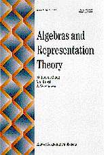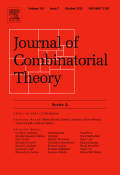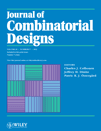
JOURNAL OF ALGEBRAIC COMBINATORICS
Scope & Guideline
Pioneering insights at the intersection of algebra and combinatorics.
Introduction
Aims and Scopes
- Algebraic Structures:
Investigates the algebraic properties and structures arising from combinatorial objects, including groups, rings, and algebras. - Graph Theory:
Explores properties of graphs, including their automorphism groups, spectral properties, and edge ideals, often applying combinatorial techniques to understand their structure. - Combinatorial Designs and Codes:
Focuses on the construction and analysis of combinatorial designs, error-correcting codes, and their applications in various mathematical and applied contexts. - Geometric Combinatorics:
Studies combinatorial aspects of geometric objects, including polytopes, arrangements, and their algebraic invariants. - Representation Theory:
Examines the representations of algebraic structures through combinatorial lenses, including the study of symmetric groups and their actions. - Matroid Theory:
Investigates matroids and their combinatorial properties, often linking them to algebraic concepts and applications.
Trending and Emerging
- Algebraic Combinatorial Structures:
There is a growing interest in the interplay between algebraic structures and combinatorial configurations, including the study of algebraic invariants of combinatorial objects. - Spectral Graph Theory:
Research on spectral properties of graphs, including eigenvalues and their applications to combinatorial problems, has seen a significant uptick, highlighting its relevance in modern combinatorial research. - Computational Techniques in Combinatorics:
The integration of computational methods and algorithms in combinatorial studies is on the rise, facilitating deeper insights and broader applications of combinatorial theories. - Higher Dimensional Combinatorial Objects:
Emerging research focuses on properties and applications of higher-dimensional structures, such as polytopes and simplicial complexes, reflecting a trend toward more complex combinatorial frameworks. - Applications of Algebraic Techniques to Combinatorial Problems:
There is an increasing application of algebraic techniques, such as homological algebra and representation theory, to tackle combinatorial problems, indicating a fusion of these fields.
Declining or Waning
- Classical Design Theory:
Research related to classical designs, such as block designs and finite geometries, has seen a decrease, possibly due to the rise of computational methods and algebraic approaches. - Elementary Combinatorial Techniques:
Traditional combinatorial techniques, which were once predominant, appear less frequently, as the field increasingly leans toward algebraic and geometric methods. - Basic Graph Properties:
Studies focused solely on basic properties of graphs, such as connectivity and planarity, are becoming less prevalent in favor of more complex algebraic and combinatorial interactions.
Similar Journals

ALGEBRAS AND REPRESENTATION THEORY
Illuminating the Path of Representation TheoryALGEBRAS AND REPRESENTATION THEORY, published by SPRINGER, is a premier journal that focuses on the cutting-edge developments in the field of algebra and representation theory. With an ISSN of 1386-923X and an E-ISSN of 1572-9079, this journal has fostered a robust platform for both established and emerging researchers since its inception in 1998. As a Q1 journal in the Mathematics miscellaneous category for 2023, it stands out for its rigorous peer-review process and commitment to academic excellence. Although it is not an open-access journal, its broad scope includes significant theoretical advancements and applications that resonate across various mathematical disciplines. Located at VAN GODEWIJCKSTRAAT 30, 3311 GZ DORDRECHT, NETHERLANDS, ALGEBRAS AND REPRESENTATION THEORY continues to contribute meaningfully to the scientific community by providing researchers with essential insights and fostering collaboration in the increasingly complex landscape of mathematics. Researchers, professionals, and students are encouraged to engage with the latest publications, as the journal plays a critical role in shaping contemporary discussions and innovations in the study of algebraic structures.

Transactions on Combinatorics
Exploring the Frontiers of Computational TheoryTransactions on Combinatorics is an esteemed academic journal dedicated to advancing the field of combinatorial mathematics. Published by UNIV ISFAHAN, VICE PRESIDENT RESEARCH & TECHNOLOGY, this journal has been an Open Access platform since 2012, ensuring that innovative research is freely available to scholars across the globe. With an ISSN of 2251-8657 and an E-ISSN of 2251-8665, it fosters a community for researchers to disseminate their findings within the realms of Computational Theory and Discrete Mathematics. The journal has been classified in the Q4 category for both its major fields in 2023 and holds notable Scopus rankings that reflect its growing influence in the academic community, despite currently being in the lower quartiles. The journal covers a diverse range of topics from theoretical frameworks to practical applications, making it a valuable resource for researchers, professionals, and students who are passionate about combinatorics. Addressed from DEPT PRINTING & PUBLISHING MAGAZINES, HEZAR-JARIB AVE, ISAFAHAN 81746-73441, IRAN, it stands as a beacon for collaborative research and knowledge sharing in this essential field.

Beitrage zur Algebra und Geometrie-Contributions to Algebra and Geometry
Fostering Excellence in Algebra and Geometry ResearchBeitrage zur Algebra und Geometrie - Contributions to Algebra and Geometry is a distinguished journal published by Springer Heidelberg, situated in Germany. With a focus on the intricate fields of Algebra and Number Theory and Geometry and Topology, this journal serves as a pivotal platform for the dissemination of innovative research and critical insights from scholars worldwide. Holding a commendable Q3 category ranking in both disciplines as of 2023, it is recognized for its contribution to advancing theoretical foundations and practical applications. The journal has consistently engaged the mathematical community since its inception in 2000, with a specific publication timeline that spans 2000 to 2002 and 2004 to 2024. Despite its absence of open-access options, the journal's articles are pivotal for researchers, professionals, and students seeking authoritative and impactful studies in algebra and geometry. Join an esteemed readership eager to explore and expand upon the boundaries of mathematical inquiry through this exceptional publication.

JOURNAL OF COMBINATORIAL THEORY SERIES A
Elevating Discrete Mathematics to New Heights.JOURNAL OF COMBINATORIAL THEORY SERIES A, published by Academic Press Inc. Elsevier Science, stands as a pivotal platform for researchers in the realm of combinatorial mathematics and theoretical computer science. With an impact factor that underscores its influence and a well-respected reputation reflected in its rapid ascent to Q1 rankings in discrete mathematics and computational theory, this journal serves as a critical resource for academics seeking to advance their understanding of complex combinatorial structures and algorithms.
Founded in 1971, the journal covers a wide spectrum of topics within combinatorial theory, providing a robust forum for innovative research and theoretical advancements until 2025. Including a strong position in the Scopus rankings—notably, it ranks #10 out of 92 in discrete mathematics—the journal is essential for both emerging scholars and established professionals committed to pushing the boundaries of mathematical and computational inquiry. Researchers are encouraged to submit their findings to this esteemed publication, as it offers a non-open-access model that ensures rigorous peer review and high visibility within the academic community.

Acta Universitatis Sapientiae-Mathematica
Fostering a vibrant community for mathematical research.Acta Universitatis Sapientiae-Mathematica is a dynamic and open-access academic journal published by SCIENDO, dedicated to advancing research in the field of mathematics. With its roots grounded in Germany, the journal has made significant strides in promoting scholarly contributions since it became open access in 2013, enhancing accessibility for researchers, professionals, and students alike. Spanning a broad spectrum of mathematical disciplines, including general mathematics, the journal engages with contemporary challenges and offers a platform to explore innovative approaches. Although currently positioned in the Q4 quartile for 2023 within the miscellaneous mathematics category and holding a Scopus rank of #290 out of 399, the journal is committed to fostering intellectual discourse and enhancing the overall quality of mathematics research. The convergence of research presented since 2014 showcases a journey toward improvement and expanding its influence in the mathematical community. Contribute to the vibrant dialogue in mathematics by exploring the latest findings in Acta Universitatis Sapientiae-Mathematica as it continues to evolve in the academic landscape.

Algebra And Discrete Mathematics
Advancing Mathematical Knowledge through Rigorous ResearchAlgebra And Discrete Mathematics, published by LUHANSK TARAS SHEVCHENKO NATIONAL UNIVERSITY, is a pivotal academic journal dedicated to exploring the realms of algebra and discrete mathematics. Since its inception in 2012, this journal has contributed significantly to the mathematical community, catering to researchers, professionals, and students interested in advancing their understanding of both classical and contemporary mathematical theories. With categories placed in Q4 in Algebra and Number Theory and Q3 in Discrete Mathematics and Combinatorics, and rankings that place it among various domains with percentiles reflecting its niche status, the journal offers a platform for innovative and high-quality research. While the journal is currently not open access, it maintains a robust academic presence, and its continuous publication until 2024 ensures a steady stream of scholarly discourse. Researchers and academics keen on disseminating their findings or keeping abreast of the latest developments in these mathematical fields will find valuable insights and diverse methodologies within its pages.

Aequationes Mathematicae
Fostering Excellence in Mathematical Research Globally.Aequationes Mathematicae is a distinguished academic journal published by SPRINGER BASEL AG, focusing on the dynamic fields of Applied Mathematics, Discrete Mathematics, and Combinatorics. Since its inception in 1968, the journal has served as a vital platform for disseminating high-quality research, with Converged Years expected to extend to 2024. With an impressive Q2 ranking in multiple mathematical disciplines as of 2023, Aequationes Mathematicae is positioned within the top half of its field, reflecting its reputation for excellence. Spanning the globe from its base in Basel, Switzerland, this journal is ideal for researchers, professionals, and students seeking to advance their knowledge and contribute to ongoing discussions within mathematics. While it does not currently offer Open Access options, readers can still access an extensive archive of impactful studies that bolster its standing within the academic community.

Journal of Combinatorics
Exploring the Depths of Combinatorial TheoryJournal of Combinatorics is a premier academic journal dedicated to advancing the field of combinatorial theory and its applications. Published by INT PRESS BOSTON, INC, it aims to provide a robust platform for researchers, professionals, and students to disseminate their findings and engage with cutting-edge developments in combinatorics. With a focus on high-quality, peer-reviewed articles, the journal fosters rigorous mathematical discussions surrounding various facets of combinatorial structures, graph theory, design theory, and combinatorial optimization. Although currently not available as an Open Access journal, the Journal of Combinatorics plays a vital role in enriching the mathematical sciences and serves as an essential resource for academics seeking to stay updated with the latest trends in combinatorial research. By maintaining a commitment to excellence and innovation, this journal is indispensable for anyone looking to deepen their understanding in this critical area of study.

Pure and Applied Mathematics Quarterly
Advancing the Frontiers of Mathematical KnowledgePure and Applied Mathematics Quarterly is a prestigious journal published by INT PRESS BOSTON, INC, focusing on the diverse and evolving field of mathematics. Since its inception in 2007, this journal has grown significantly, currently holding a Q1 ranking in the Mathematics (Miscellaneous) category for 2023, positioning it among the leading publications in the discipline. With a commitment to publishing high-quality research, Pure and Applied Mathematics Quarterly fosters innovation and dialogue within the mathematical community by providing a platform for theoretical advancements and practical applications. The journal remains accessible to researchers and professionals through its ISSN 1558-8599 and E-ISSN 1558-8602, although it does not currently offer open access. As a vital resource for mathematicians, educators, and students, this journal endeavors to expand the frontiers of mathematical knowledge and contribute to the academic dialogue surrounding this fundamental science.

JOURNAL OF COMBINATORIAL DESIGNS
Connecting Researchers through Combinatorial InnovationJOURNAL OF COMBINATORIAL DESIGNS, published by Wiley, is a leading peer-reviewed journal that serves as a vital platform for researchers in the field of discrete mathematics and combinatorics. With an impressive Q1 ranking in the 2023 category, it stands at the forefront of academic discourse, showcasing significant developments and innovative research from 1993 to 2024. The journal is dedicated to the study of combinatorial designs, including their applications in various scientific disciplines, which enhances its relevance among mathematicians and applied scientists alike. Although it operates on a traditional subscription model, the journal continues to attract high-quality submissions, as evidenced by its Scopus rank of #40 out of 92 in Discrete Mathematics and Combinatorics, placing it in the 57th percentile. Its commitment to advancing knowledge in combinatorial theory and applications makes it an essential resource for professionals, researchers, and students seeking to deepen their understanding and contribute to this dynamic field.